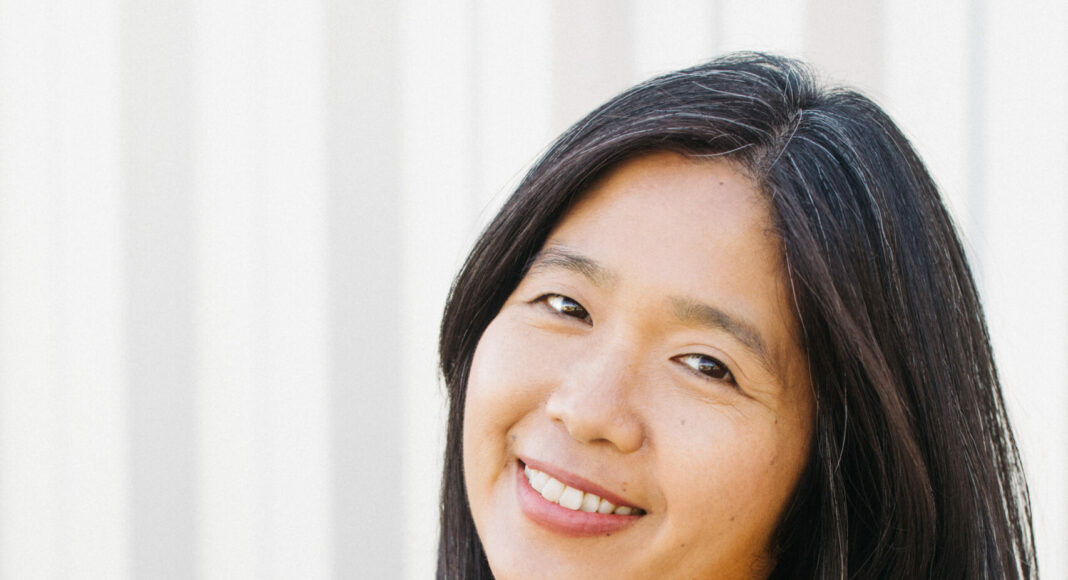In Vanessa Hua’s 2022 historical novel, Forbidden City, Mei, a teenage peasant girl in 1960s China, is plucked from her rural village to join Chairman Mao’s ballroom dancing troupe, becoming his protégé, swimming buddy and lover.
Though Mei has agency and dreams of being a model revolutionary, she plays an unexpected role in the Cultural Revolution before escaping to Chinatown in San Francisco, where she reflects back on her life story. Forbidden City reads like a tribute to ambitious marginalized women often erased by the men who write history.
In her career as a newspaper journalist, Hua reported from her ancestral land of China and researched the hidden corners of Mao’s life. She came up with the fictional main character Mei after seeing a photo of Mao surrounded by a dancing crew of giggling teenage girls dressed in plaid Peter Pan collars.
“For these young women, it was the most exciting, exhilarating experience of their lives,” Hua says. “And I knew it had to be more complicated than that. I was particularly intrigued by those who managed to stay by his side. I wanted to be able to tell the story of one of these young women who don’t even carry a footnote and yet in their own way had a hand in shaping history.”
On Nov. 10, the Center for Literary Arts at SJSU brings Hua to Hammer Theatre, along with novelists Kirstin Chen and C Pam Zhang. Hua lives in San Francisco where she also writes a column for the Chronicle. Chen and Zhang are both former San Franciscans.
Earlier this year, Chen released her third novel, Counterfeit, a caper story that debuted at #5 on the New York Times Best Seller list and is already optioned for television. Which makes sense. It screams for a TV-series adaptation. The main thread features two old college roommates from Stanford, Ava and Winnie, who run a counterfeit luxury handbag operation. All throughout the book, one finds a brilliant, not-subversive-at-all ridicule of the insidious “model minority” nonsense in which Asian Americans often get subsumed. We also see hysterical differences between how first- and second-generation immigrants experience the American Dream and how people back home in the root country view America, in regards to success, honesty, ambition and capitalism.
Radically different from Chen and Hua’s recent books, Zhang’s debut 2020 novel, How Much of These Hills is Gold, is a dark impressionistic transformation of the Gold Rush-era Wild West, telling a story of orphaned Chinese-American siblings with powerful overtones of displacement, grief, abandonment and melancholy. It begins with two sisters stealing a horse to help them bury their father’s rotting corpse. The reader is then brought into a coming-of-age survival story that cuts through the mythology of the American West, adding layers of gender identity, racism, intergenerational trauma and Chinese tigers. B-flick Western tropes harmonize with a Chinese poetic sensibility in a tight literary prose format.
In each case, the novels of Hua, Chen and Zhang fearlessly normalize a transnational identity and demonstrate the absurdity of defining anyone according to borders. All three books won numerous awards and accolades. Each author regularly appears at conferences all over the world and publishes fiction and nonfiction. Yet that’s where the similarities end.
“Our three books, it should be noted, couldn’t be more different,” Hua emphasizes. “I think they just reflect how the Chinese community is not a monolith.”
All of which demonstrates the evolution of the Center for Literary Arts series at SJSU. Twenty-five years ago, when author events around here were a more bougie, vanilla experience, one could feel alienated without a turtleneck and a sport coat. Back then, there was no such thing as a triple shot of award-winning Asian American women novelists commanding a stage in downtown.
These days, the academic literary canon is no longer a survey of dead white drunks. Over the last five years in particular, the sheer variety of Asian, Asian American and diasporic writers has increased, evolved and expanded more than ever before. Hua says she hopes it will continue.
“I’m just honored at this flourishing.”
Kirstin Chen, Vanessa Hua, C Pam Zhang
Thu, 7pm, Free
Hammer Theatre, San Jose



